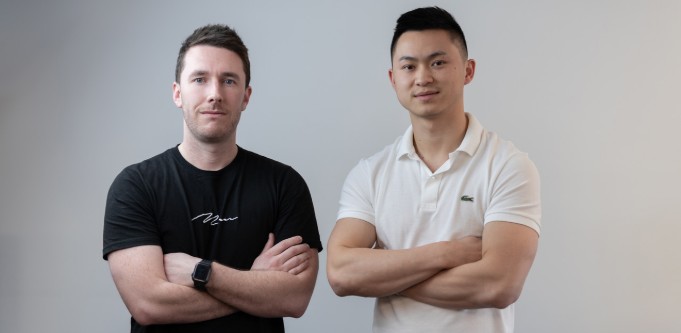
SnapWireless founders Mark Johnston and Michael Wang (left to right). Source: supplied.
Less than three years ago, Michael Wang and Mark Johnston were flipping cars in between sales jobs at Telstra and their university studies.
Today, in their mid-twenties, the entrepreneurs are running a multimillion-dollar retail business, and they’re selling to the telecoms giant — not for it.
The pair are the founders of SnapWireless, a portable wireless charging retailer growing like a sprout as smartphone users around the world ditch cords in droves.
Founded in 2017, the pair say their business is on track to book $3.6 million in revenue this year, reaching the multimillion-dollar milestone without any external funding.
For Wang and Johnston, who started the company with just $12,000 worth of vehicle proceeds, it’s been a busy few years.
When Apple announced wireless charging technology would be enabled on its iPhone, Apple Watch and AirPod products in 2017, the pair realised there was money to be made for an upstart retail business specialising in the tech.
“We already had a bit of background in understanding tech,” Wang tells SmartCompany.
“We knew with Apple launching it, there would be big hype behind it.”
They were right. SnapWireless is fulfiling 1,500-2,000 orders every month at the moment to customers in Australia, the United States and Europe through e-commerce operations and stock deals with Telstra.
“We knew the way Telstra operated, so we knew the proper sales pitch to go in with,” Johnston explains.
After gaining initial traction, launching products into 15 Telstra stores in their first six months, the telecoms giant recognised the opportunity too and greenlighted a statewide deal in South Australia.
“We were ahead of everyone else, even the bigger wholesalers,” Johnston says.
From smartphones to laptops, headphones and cars, battery technology has become so integral to modern life that companies such as Tesla are warning about shortages of the minerals used to make them.
All those batteries need to be charged — outlining an addressable market Wang and Johnstone say positions them for ongoing growth.
Cable-based charging has been part-and-parcel with portable electronics since their inception, but the defining consumer technology of the 21st century is evolving rapidly, with wireless charging tech regarded as better for the long-term health of devices such as smartphones.
Wang says Snap’s products, which include wireless power banks, car chargers and socket-based wireless pads, can fast-charge an iPhone at about 1% every two minutes, or 1% every minute for Samsung phones.
While that’s slower than the cable-based PD fast-charging recently unveiled by Apple, the entrepreneurs are betting cordless will be the way of the future.
“It’s still a top-end thing to have wireless charging, but within two-to-three years, all phones will be charging wirelessly,” Johnston predicts.
The potential applications for the technology are vast, and that excites the entrepreneurs, who say they’re enjoying running a business and developing products.
Wang says he wants SnapWireless to be on the front foot as Australian shopping centres, cafes and other public spaces implement wireless charging into infrastructure — similar to what’s already occurring in Europe.
“In Europe, you go to a coffee shop, put your phone on the table and it charges,” Wang says.
There are even plans to transition the business into something similar to a Software-as-a-Service company, with an accompanying app showing customers where they can access chargers on a map.
Before that, an all-in-one wireless charging product that will also include corded options is on the product roadmap as the company looks to expand its product range to support further growth.


COMMENTS
SmartCompany is committed to hosting lively discussions. Help us keep the conversation useful, interesting and welcoming. We aim to publish comments quickly in the interest of promoting robust conversation, but we’re a small team and we deploy filters to protect against legal risk. Occasionally your comment may be held up while it is being reviewed, but we’re working as fast as we can to keep the conversation rolling.
The SmartCompany comment section is members-only content. Please subscribe to leave a comment.
The SmartCompany comment section is members-only content. Please login to leave a comment.